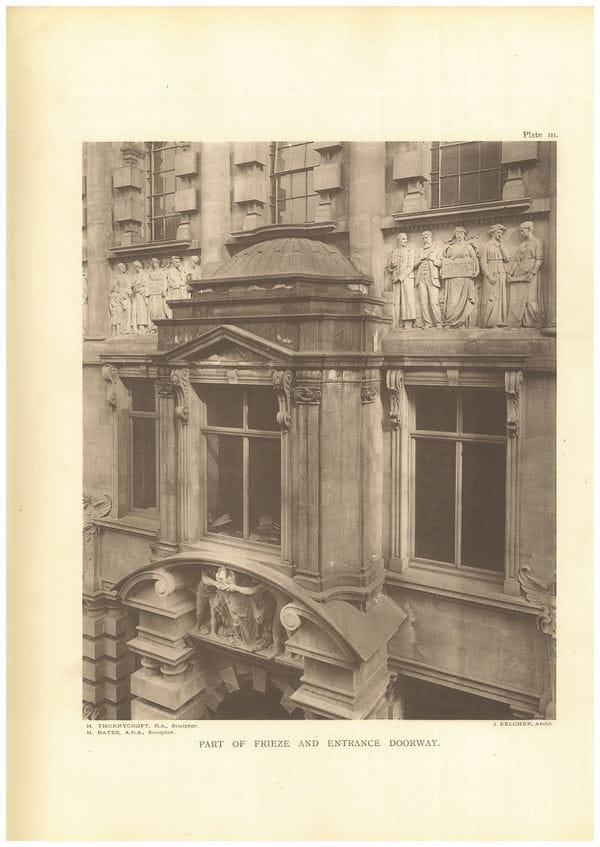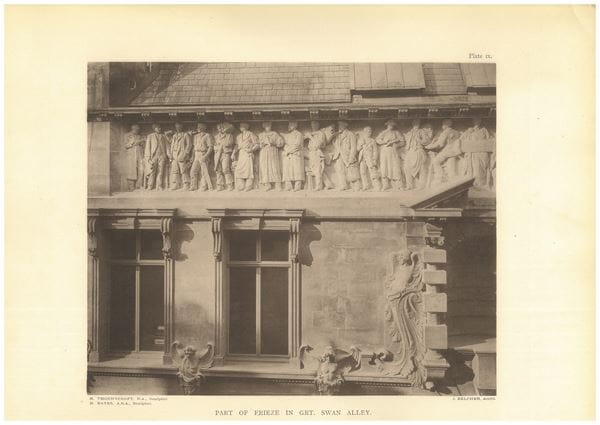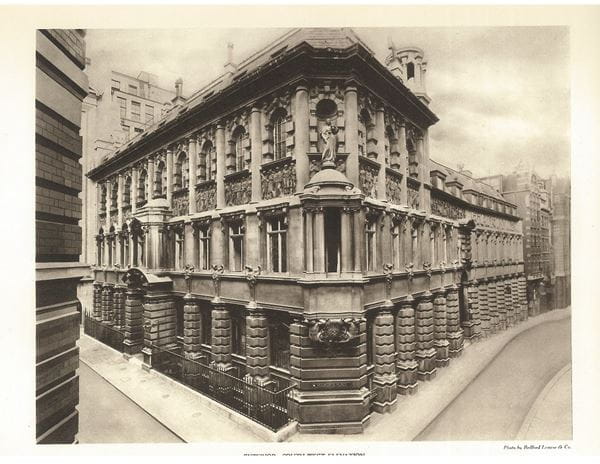Chartered Accountants' Hall, headquarters of ICAEW in the City of London, was built between 1890 and 1893. It features 19th century external friezes and sculpture by Hamo Thornycroft RA and Harry Bates ARA. These are further complemented by 20th century friezes added by H.A. Stevenson and David McFall RA.
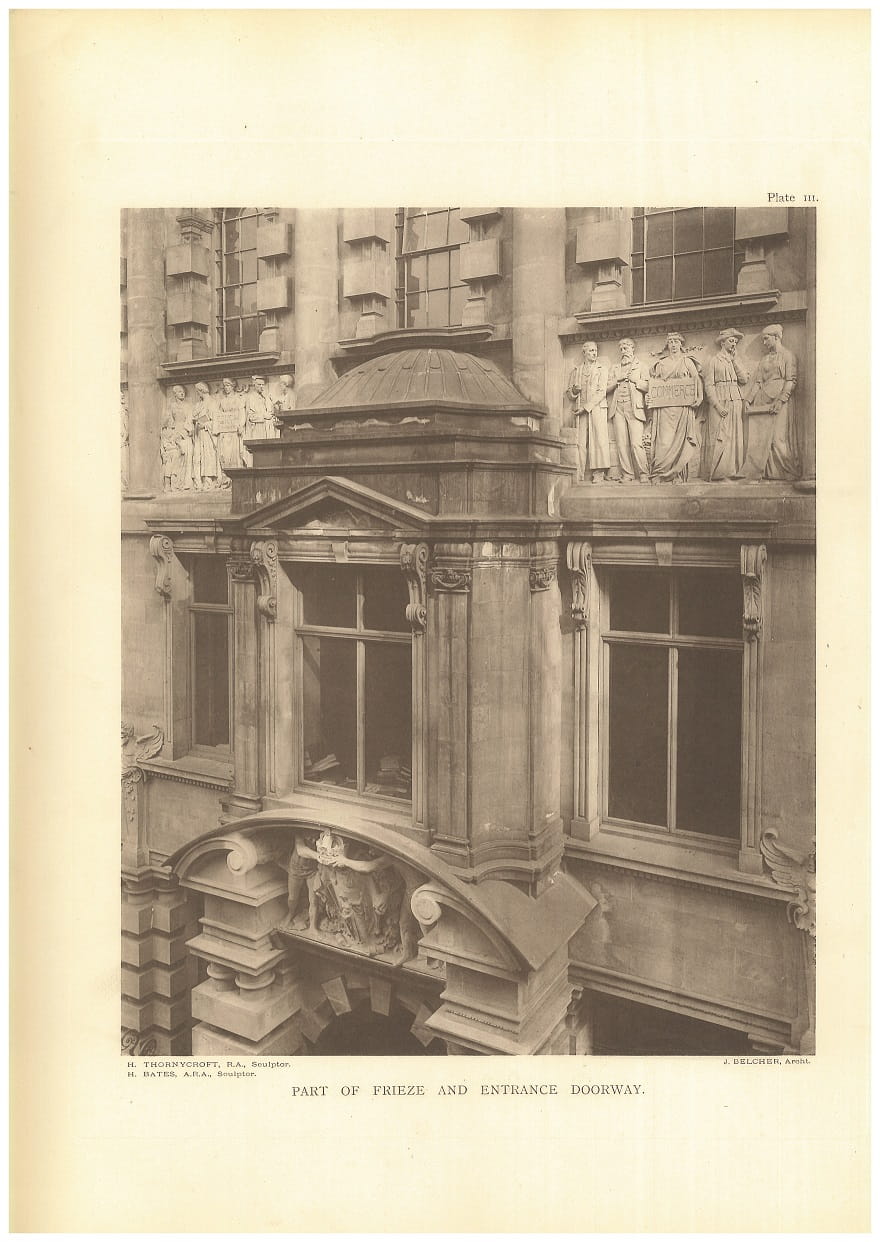
Overview
19th century friezes and sculptures
The sculptured frieze and the figure of Justice surmounting the oriel at the angle of the original building are by Hamo Thornycroft RA. The sculptures above the Moorgate Place entrance and the corbel at the junction with Great Swan Alley are by Harry Bates ARA.
William Hamo Thorncroft (1850-1924) and Harry Bates (1850-1899) were members of the New Sculpture movement who were committed to realism in their works. Thornycroft is thought to have been the first artist to make a life-size statue of a working class labourer in Britain with 'The Mower' (1884).
Sculpture
Harry Bates carried out the sculpture over the main entrance, which depicts the ICAEW coat of arms, surrounded by two graceful classical style figures who support a crown, representing the Royal Charter. A series of heavyweight Portland stone columns surround either side of the entrance, providing support for ornamental winged figures, also sculpted by Bates.
Frieze
The friezes are allegories in human form. Thornycroft's contribution is a series of panels with figures representing concepts from the Arts and Sciences to the Colonies, as well as a frieze depicting figures from the professions and crafts connected with building. In his diaries Thornycroft said that he felt a 'special rapport with the working classes' and his dedication to depicting scenes of everyday life can be seen here in his use of the workers constructing Chartered Accountants' Hall as his models for the frieze.
Thornycroft based the figure of the sculptor on himself and the architect on the building's main architect, John Belcher. The figure of the solicitor is H. Markby of Markby, Stewart & Co., who acted for ICAEW in its early years.
The full line-up (L-R) is as follows: surveyor (possibly G. Smith, acting clerk-of-works for the contractors); Architect (John Belcher, architect of the building); navvy with pickaxe; bricklayer with trowel; hodman with mortar; stonemason; sculptor in blouse (Hamo Thorneycroft); carver (possibly George Hardie); carpenter; smith; plumber with his boy; plasterer; paperhanger; decorator; building (empty niche below was originally intended for a bronze statue of Queen Victoria); furnisher holding a chair; solicitor (H.F. Markby).
20th century friezes
H.A. Stevenson sculptured the frieze which continues on the 1930's extension. Stevenson's work depicts the history of architecture, starting with a caveman on the extreme right and including Wren with a model of St Paul's. The truncated figures at the feet of the Statue of Justice are 'the upper parts of figures representing accountants, one in the act of examining a candidate and the other auditing accounts'.
The 1930's line-up (L-R): J. A. Stevenson (sculptor of the 1930's frieze); J.J. Joass (architect of the 1930s extension); Charles Robert Cockerell (architect); William Chambers (architect) Christopher Wren (architect, holding model of St Pauls); Inigo Jones (architect); Andrea Palladio (Italian architect); Giacomo Barozzi da Vignola (Italian architect); Donato Bramante (Italian architect), Michelangelo; Leonardo Da Vinci; Filippo Brunelleschi (Italian architect); renaissance youth (with mirror symbolising revival); priest; stonemason; Gothic architect; Byzantine with model of basilica; Byzantine; four Romans with a model of an arch; three ancient Greeks; two Assyrians with a lamassu (human-headed winged bull); Egyptian priest with model of a pyramid; Egyptian slave carrying a piece of stone; Egyptian architect; prehistoric man.
The 1930s extension added 50ft to the frieze, bringing it up to a total of 190ft, with 68 figures. J.J.Joass had initially refused his consent to be included but was eventually persuaded by Stevenson's arguments.
In 1968-69 the frieze was further extended with three separate panels by David McFall RA (as part of the William Whitfield extension that was opened in 1970). These new panels depict Egyptians and the foundation of accounting, seven Victorian style figures representing the founders of ICAEW, and four Renaissance figures - including Luca Pacioli, the first person to publish a work on double-entry bookkeeping and Leonardo Da Vinci. McFall was known for his emotionally powerful direct stone carving of figures.
This Frieze [...] represents those varied interests which look to the Chartered Accountants for financial guidance and order, is one of the chief features of the building and forms an integral part of the design."
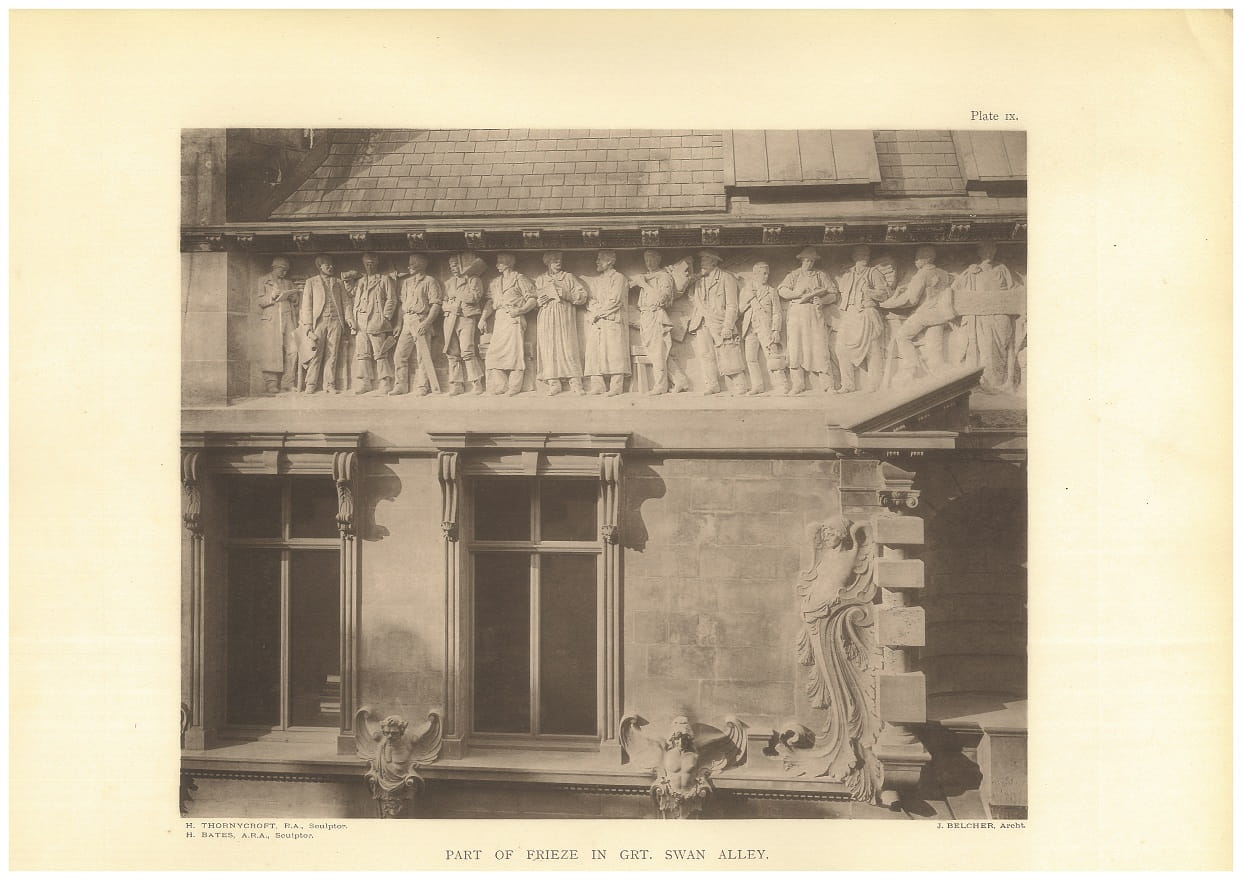
Image gallery
Further sources of information
The ICAEW Library & Information Service holds a collection of books and articles on Chartered Accountants' Hall, covering the original building and the later extensions. See our Further reading page for details of these, as well as links to web pages on the sculptors and artists whose work decorates the building.
Can't find what you're looking for?
The ICAEW Library can give you the right information from trustworthy, professional sources that aren't freely available online. Contact us for expert help with your enquiries and research.
One Moorgate Place
Information on how to hire One Moorgate Place, home of Chartered Accountants' Hall, for conferences, meetings, weddings, parties, private dining and special occasions.

